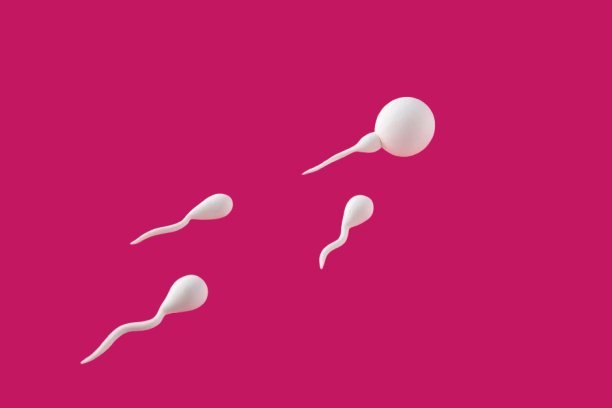Scanty Production of Sperm: How to Boost Sperm Count

A healthy male produces 15 to 200 million sperm per milliliter of semen, and it is considered a normal sperm count [1]. Semen is the ejaculatory fluid that contains sperm.
Scanty production of sperm refers to the lower number of sperm cells per milliliter of semen. This condition is a medical diagnosis and it is called oligospermia [2]. This condition can make it more difficult for a man to father a child, as fewer sperm reduce the chances of fertilizing an egg.
In this article, we will cover some of the most common causes of low sperm amount and how you can improve sperm concentration naturally.
What is Oligospermia?
Oligospermia is a medical term for low sperm count. It refers to a condition where a man has fewer than 15 million sperm per milliliter of semen.

This condition can affect a man's ability to conceive naturally. This is because lower sperm will be available to swim towards the egg and fertilize it in the female body.
However, it's important to note that a low sperm count does not always prevent conception. It simply reduces the chances of fertilizing an egg.
Medical Conditions Impacting Sperm Count
Different health conditions can impact sperm production or harm reproductive organs which can result in scanty production of sperm. The most common medical conditions responsible for low sperm count are:
-
Varicocele
Varicocele is a condition where the veins in the testicles become enlarged [3]. This can lead to poor blood flow and overheating in the testicles, which affects sperm production and lowers sperm count.
-
Infections
Certain infections, such as sexually transmitted infections (STIs) or prostatitis, can interfere with sperm health [4]. These infections can cause inflammation or scarring in the reproductive organs, which may block sperm production or release.
-
Hormonal Imbalances
Hormones like testosterone play a key role in sperm production. If a man has imbalances in hormones like testosterone, luteinizing hormone (LH), or follicle-stimulating hormone (FSH), it can disrupt sperm production and reduce sperm count [5].
Lifestyle Choices Impacting Sperm Count
Some lifestyle habits that can promote the development of oligospermia are:
- Excessive Alcohol Consumption: Drinking too much alcohol can disrupt hormone levels that are essential for sperm production. This can lead to a lower sperm count and reduce the chances of conception.
- Recreational Drug Use: Using recreational drugs like marijuana or steroids can negatively impact sperm production. These substances can alter hormone levels and reduce sperm quality and count.
- Obesity: Being overweight or obese can affect hormone levels, including testosterone, which is important for sperm production. This can lead to lower sperm counts and reduced fertility.
- Frequent Heat Exposure: Regular exposure to heat, such as from hot tubs or tight clothing, can raise the temperature of the testicles. This can harm sperm production and lower sperm count.
Impact of Nutritional Deficiency on Sperm Count
Certain nutrients like vitamins, minerals, and antioxidants are important for healthy sperm production [6]. Deficiency in these nutrients can lead to low sperm count, and sometimes male infertility.
Important nutrients for sperm count and sperm health are:
- Zinc
- Selenium
- vitamin C
- Vitamin E
- Folic acid
- Omega-3 fatty acids
Without enough of the above-mentioned nutrients, sperm quality and count can suffer. Eating a balanced diet rich in these nutrients can help support sperm production and improve overall fertility.
In addition to a balanced diet, you can also get these nutrients from supplements. Fertility supplements for men offer all the essential nutrients needed for healthy sperm production.
Other Low Sperm Count Causes
Stress can impact hormone levels, which may lower sperm production and reduce sperm count. High levels of stress can also affect sexual health overall.
Age-related changes also play a role, as sperm quality and quantity naturally decline with age. As men get older, sperm motility decreases, making conception more difficult.
How Can You Improve Sperm Count?
If you have a medical condition that is causing a reduction in sperm count, you have to seek medical advice from a specialist. However, if you are not suffering from any health issue of fertility problems, you can boost sperm concentration naturally by following tips:
- Maintain a healthy weight, as obesity can lower sperm count and impact hormone levels.
- Eat a balanced diet rich in vitamins, minerals, and antioxidants that support sperm production.
- Avoid smoking and excessive alcohol, as both can harm sperm quality and reduce count.
- Manage stress through relaxation techniques, as stress can interfere with hormone balance.
- Avoid overheating the testicles by limiting hot tubs and wearing loose-fitting underwear.
The Bottom Line
Scanty sperm production can be a serious problem for men trying to conceive. A lower number of sperm released during sexual intercourse can reduce the chance that any sperm will swim all the way to the egg and fertilize it. Scanty production of sperm is often medically referred to as oligospermia, which is diagnosed when sperm counts fall below 15 million per milliliter.
Some causes of low sperm count can’t be treated but you can manage some causes by adopting a healthier lifestyle. A balanced diet, physical activity, and a stress-free environment are some effective ways to boost sperm count and enhance male fertility.
Resources Used
- Low sperm count - Diagnosis and treatment - Mayo Clinic. (2022b, December 17). https://www.mayoclinic.org/diseases-conditions/low-sperm-count/diagnosis-treatment/drc-20374591
- Choy, J. T., & Amory, J. K. (2020). Nonsurgical Management of Oligozoospermia. The Journal of Clinical Endocrinology and Metabolism, 105(12), e4194. https://doi.org/10.1210/clinem/dgaa390
- Eisenberg, M. L., & Lipshultz, L. I. (2011). Varicocele-induced infertility: Newer insights into its pathophysiology. Indian Journal of Urology : IJU : Journal of the Urological Society of India, 27(1), 58-64. https://doi.org/10.4103/0970-1591.78428
- Wang, S., Zhang, K., Yao, Y., Li, J., & Deng, S. (2021). Bacterial Infections Affect Male Fertility: A Focus on the Oxidative Stress-Autophagy Axis. Frontiers in Cell and Developmental Biology, 9. https://doi.org/10.3389/fcell.2021.727812
- Wang, S., Zhang, K., Yao, Y., Li, J., & Deng, S. (2021). Bacterial Infections Affect Male Fertility: A Focus on the Oxidative Stress-Autophagy Axis. Frontiers in Cell and Developmental Biology, 9. https://doi.org/10.3389/fcell.2021.727812
- Bashir, S. (2024j, September 8). What Vitamins Should A Man Take When Trying To Conceive. Conceive Plus®. https://conceiveplus.com/blogs/blog/what-vitamins-should-a-man-take-when-trying-to-conceive













